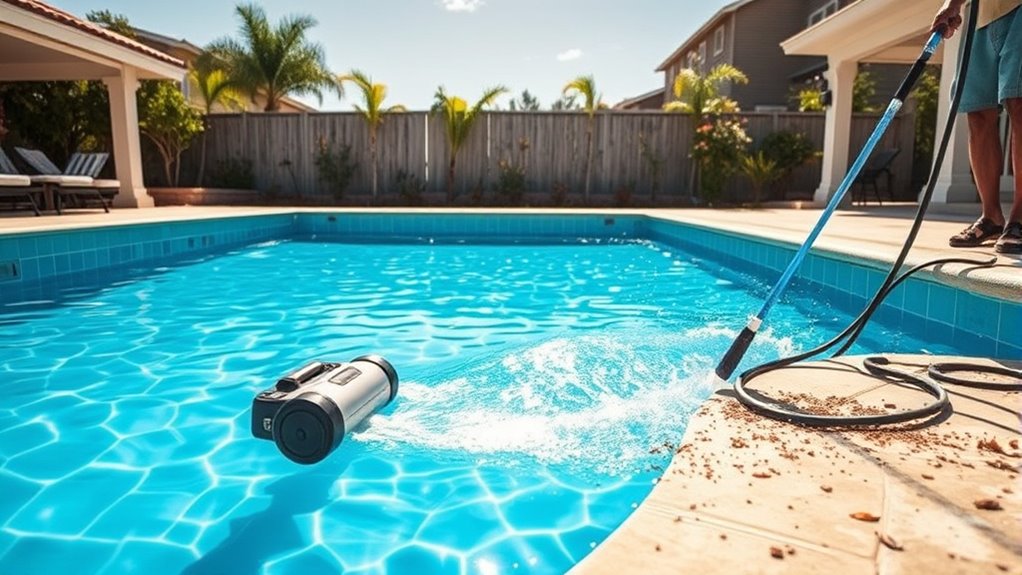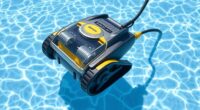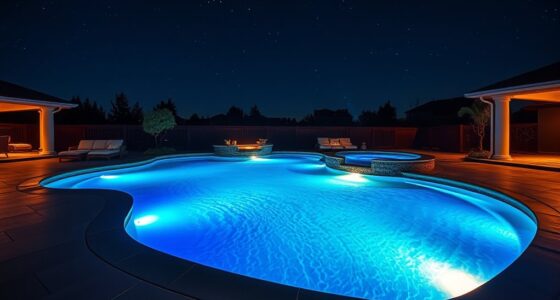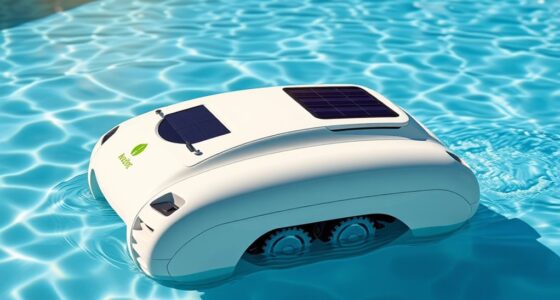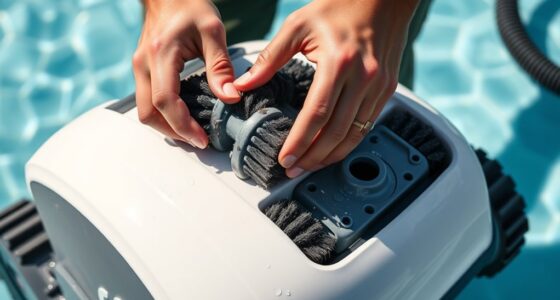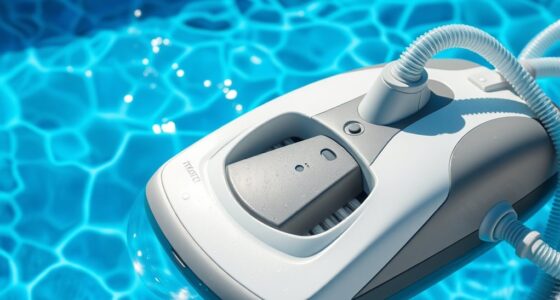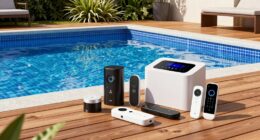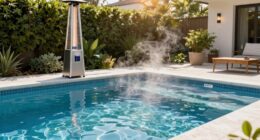Pressure pool cleaners are easy to operate and work automatically, helping you keep your pool clean with minimal effort. They circulate water and debris effectively, but they can use more energy and may struggle in tight or complex areas. Setup and maintenance are straightforward, yet they depend on your pool’s filtration system. If you want to maximize their benefits and learn how to address their limitations, there’s much more to think about below.
Key Takeaways
- Pressure pool cleaners are easy to operate and maintain, requiring minimal manual effort for regular cleaning.
- They depend on pool water pressure and filtration, which can limit mobility and thorough coverage.
- Higher energy consumption compared to robotic cleaners can increase ongoing costs.
- Proper setup and routine maintenance are essential to ensure optimal performance and longevity.
- They are suitable for various pool sizes and shapes but may struggle with complex or tight areas.
Advantages of Pressure Pool Cleaners
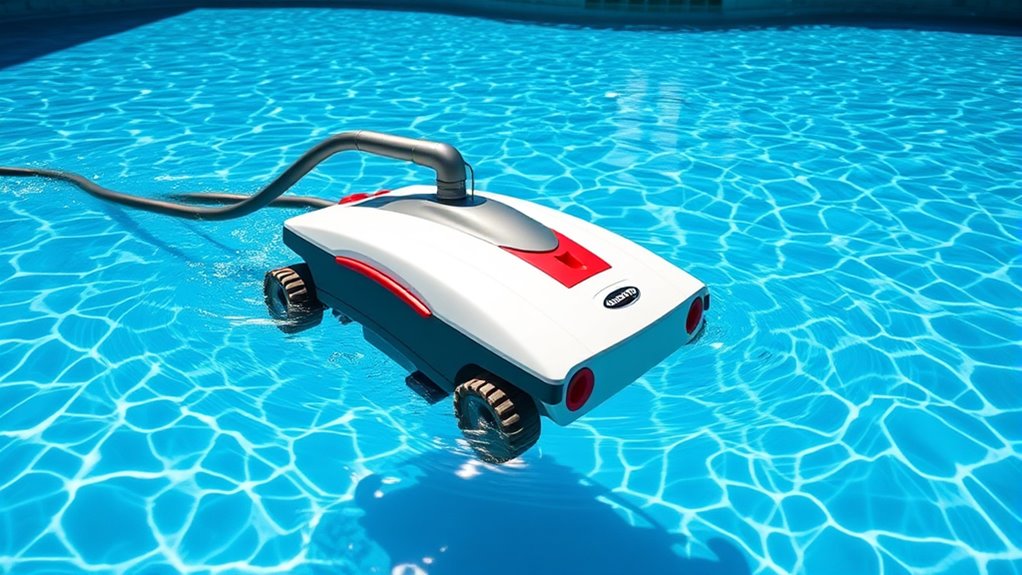
Pressure pool cleaners offer several advantages that make them a popular choice for maintaining a clean pool. One key benefit is their efficiency, as they operate with minimal manual operation, reducing your effort. Once set up, they automatically move around the pool, cleaning debris and dirt effectively. These cleaners also help maintain the chemical balance because they keep the pool water circulating, preventing the buildup of algae and bacteria. Additionally, pressure cleaners are compatible with various pool sizes and shapes, providing versatility. They are typically easy to install and operate, making them a convenient option for regular maintenance. Moreover, home cleaning tips and maintenance can enhance the effectiveness of pool cleaning routines by ensuring proper equipment care. Proper filter system operation is essential to maximize the performance of pressure pool cleaners and extend their lifespan. Regularly inspecting and cleaning the pressure hoses and fittings can prevent blockages and leaks, ensuring consistent cleaning performance. Using professional advice can also help troubleshoot issues and improve cleaning efficiency. Additionally, choosing the right cleaning schedule ensures your pool remains consistently clean and ready for use. Overall, pressure pool cleaners simplify keeping your pool spotless, saving you time and effort while ensuring the water remains clean and properly balanced.
Limitations and Drawbacks of Pressure Pool Cleaners
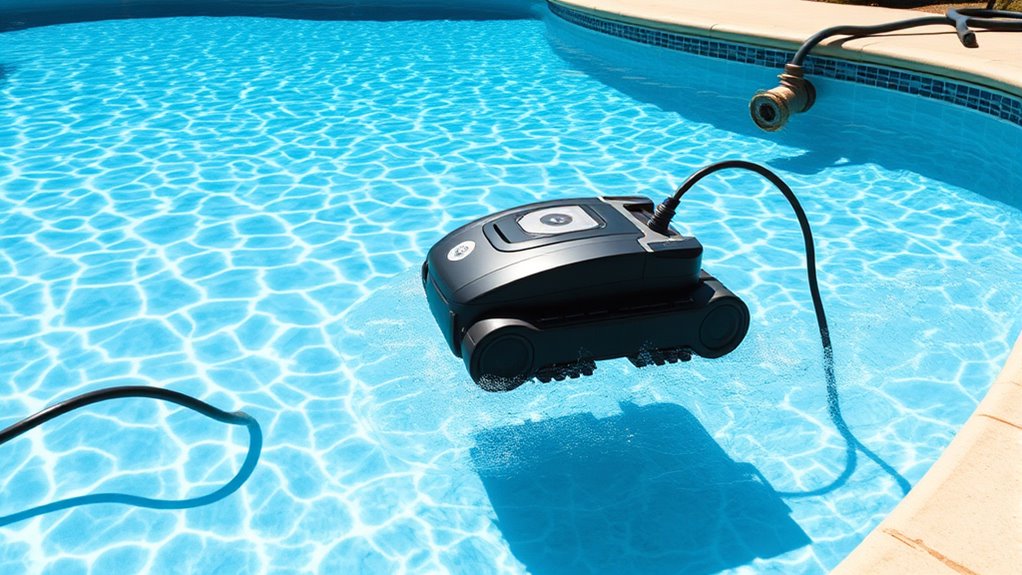
While pressure pool cleaners are effective in many situations, they do have notable limitations. One main drawback is the need for manual operation to set up and position the cleaner properly, which can be time-consuming and inconvenient. They also tend to have higher energy consumption compared to robotic models, leading to increased operational costs. Additionally, pressure cleaners may struggle with thorough coverage, especially in pools with complex shapes or tight corners, leaving some areas uncleaned. They rely on a hose connected to a pump, meaning you’re dependent on your pool’s filtration system and water pressure. This setup can limit mobility and make it difficult to clean certain spots efficiently. Furthermore, Volkswagen Tuning principles highlight that improper modifications can lead to increased wear and tear, which is a consideration for pressure cleaner maintenance. The efficiency of these cleaners is also influenced by water pressure, which can vary and affect cleaning performance. A proper maintenance routine is essential to keep pressure cleaners functioning effectively over time. Fluctuations in water flow can impact the overall cleaning effectiveness, requiring users to monitor and adjust settings regularly. Additionally, the effectiveness of pressure cleaners can be impacted by filter system limitations, which may reduce their ability to pick up fine debris. Overall, these factors can reduce the convenience and cost-effectiveness of pressure pool cleaners.
Cost and Maintenance Considerations
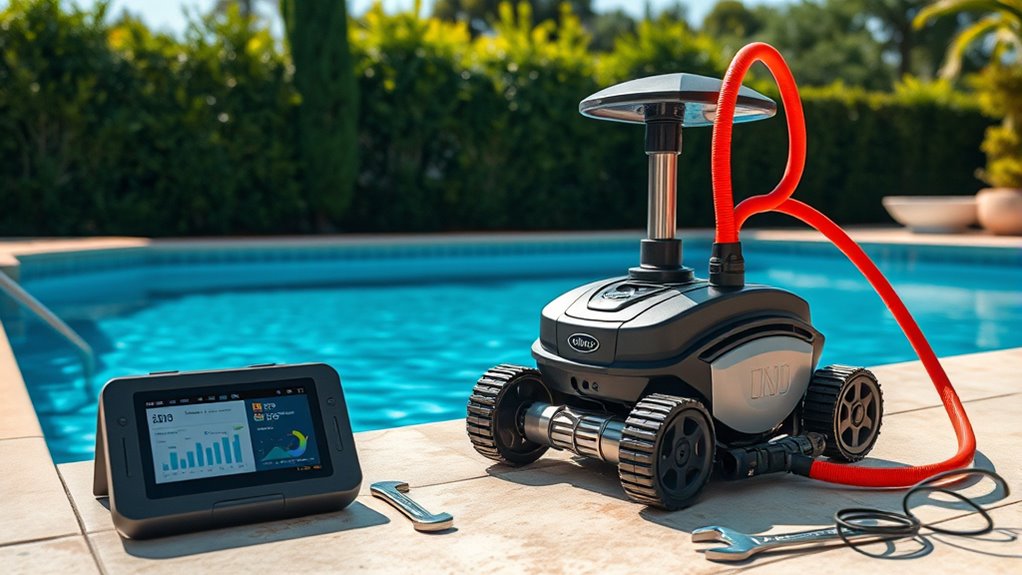
When evaluating pressure pool cleaners, one of the key factors to contemplate is their cost and ongoing maintenance. Conducting a thorough cost analysis helps you understand the initial purchase price and long-term expenses. These cleaners typically come with a moderate upfront cost, but maintenance requirements can vary. You’ll need to regularly check hoses, replace worn parts, and clean filters to guarantee ideal performance. Proper self-maintaining features can reduce the frequency of manual upkeep, making maintenance more manageable. Additionally, understanding the effects of regular upkeep on the cleaner’s longevity can help prevent costly repairs down the line. Regular inspections and timely replacements of parts can also improve the overall safety and quality of the cleaning process. While pressure cleaners generally require less maintenance than robotic models, neglecting routine upkeep can lead to reduced efficiency or costly repairs. Consider whether the sound healing science demands fit your schedule and budget. Balancing the initial investment with ongoing upkeep helps you determine if a pressure pool cleaner aligns with your financial and time commitments.
Suitability for Different Pool Types
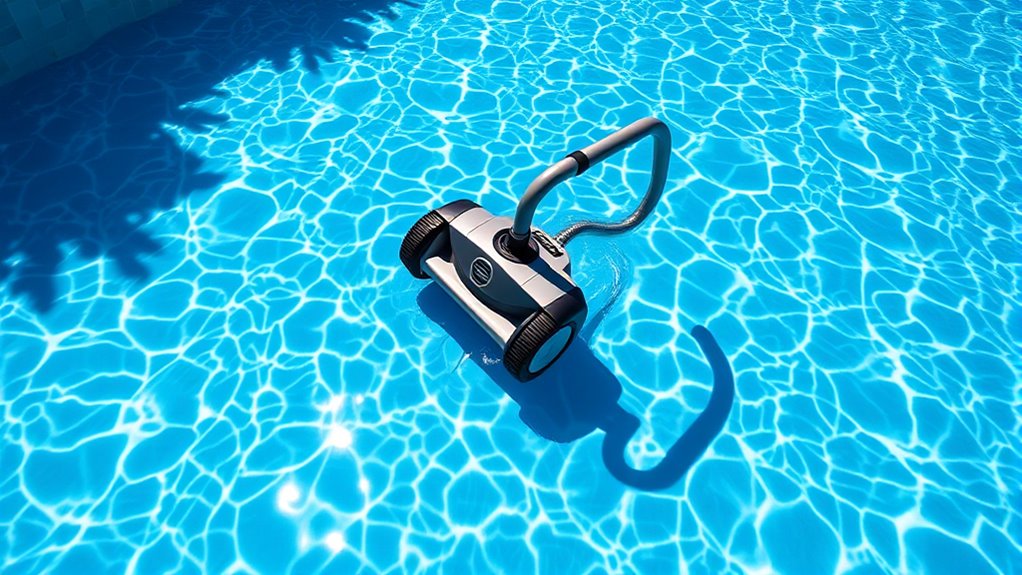
Choosing the right pressure pool cleaner depends heavily on your pool’s type and size. If you have a small, simple pool, manual operation might be sufficient, giving you control over cleaning sessions. Larger or more complex pools, like those with multiple skimmers or irregular shapes, benefit from models with automatic scheduling, allowing the cleaner to operate consistently without your constant oversight. Some pressure cleaners work better on in-ground pools, while above-ground pools may require models specifically designed for their dimensions. Consider your pool’s surface and debris load, as certain cleaners are more effective in specific conditions. Additionally, evaluating the efficiency of cleaning methods can help you select a model that minimizes energy use and maximizes performance. This can also influence your decision, as energy-efficient models contribute to cost savings over time. When selecting a cleaner, assessing the materials used in construction can ensure durability and longevity. Understanding the growth stages of chia seeds can help you time your maintenance and harvesting efforts more effectively. Ultimately, matching your pool type with a pressure cleaner that offers suitable features guarantees efficient, hassle-free maintenance.
Tips for Maximizing Effectiveness
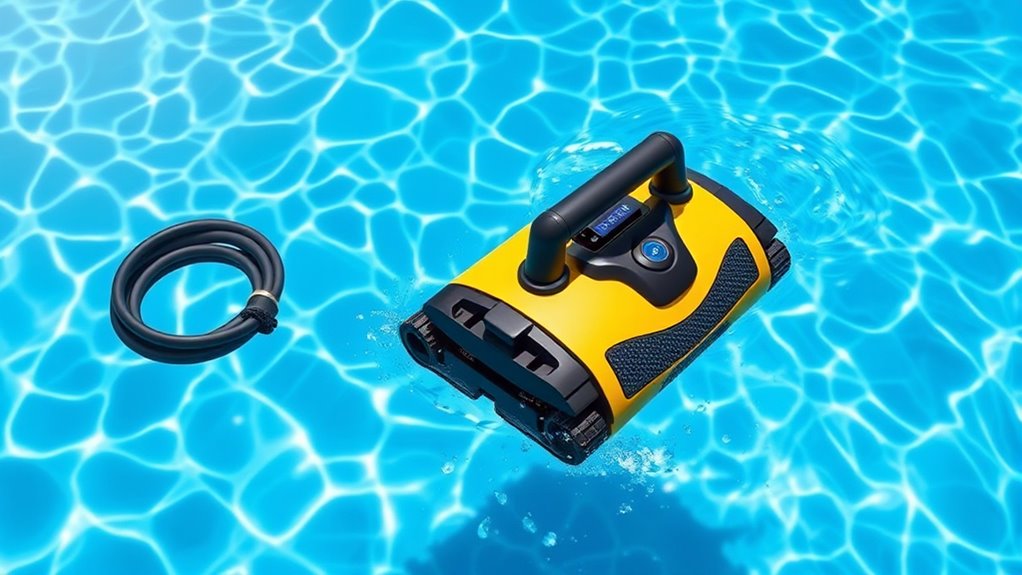
To get the most out of your pressure pool cleaner, start by ensuring it’s properly set up and maintained. Regularly check for obstructions and clean the filter to keep it operating efficiently. Incorporate manual operation when needed to target stubborn debris or hard-to-reach spots. Maintaining proper chemical balance is essential, as balanced water reduces debris buildup and enhances cleaning performance. Additionally, consider the following tips:
- Adjust the cleaner’s settings based on pool size and debris type
- Regularly inspect hoses and connections for leaks or blockages
- Schedule routine pool chemical testing to prevent algae and dirt accumulation
- Be aware of automation technologies that can help streamline your pool maintenance routine
- Exploring pressure pool cleaner upgrades can lead to more thorough and efficient cleaning cycles
- Using a HEPA filtration system can also improve overall water quality by reducing airborne particles that may settle in the pool. Proper filter maintenance routines not only ensure continuous optimal performance but also extend the lifespan of your cleaning equipment.
Frequently Asked Questions
How Long Do Pressure Pool Cleaners Typically Last?
Pressure pool cleaners usually last between 3 to 5 years, depending on maintenance frequency and usage. To prolong their lifespan, you should regularly check for wear and tear, clean the filter, and inspect hoses. Keep in mind that cost considerations also play a role; investing in quality models or proper maintenance can prevent costly repairs or replacements sooner. Proper care ensures your cleaner remains effective and lasts longer.
Are Pressure Pool Cleaners Environmentally Friendly?
You might wonder if pressure pool cleaners are eco-friendly. While they help keep your pool clean efficiently, they can contribute to chemical runoff if not used properly, potentially harming nearby plants and water sources. Additionally, they produce noise pollution, which can disturb your surroundings. Overall, they’re not entirely environmentally friendly, but using them responsibly and maintaining them well can minimize their impact on the environment.
Can Pressure Pool Cleaners Be Used in Saltwater Pools?
Think of your saltwater pool as a delicate garden needing gentle care. Pressure pool cleaners can be used in saltwater pools, but you need to verify saltwater compatibility. They’re effective for pool maintenance, but high salt levels might corrode certain parts. Check your cleaner’s specifications and opt for models designed for saltwater. Proper maintenance ensures your cleaner works smoothly, keeping your pool pristine without damaging its salty sanctuary.
Do Pressure Pool Cleaners Work Effectively in Large Pools?
You’ll find that pressure pool cleaners can work effectively in large pools, especially if they have good robotic navigation. Their ability to cover extensive areas means they often clean large pools efficiently. However, be aware of their power consumption, which can be higher with bigger pools. Proper placement and maintenance help optimize their performance, ensuring you get a thorough clean without wasting energy.
What Safety Precautions Should Be Taken When Using Pressure Cleaners?
Safety is your shield against potential hazards, like a lighthouse guiding a ship. When using pressure pool cleaners, always wear safety gear such as goggles and gloves to protect yourself. Be aware of hazards like high-pressure jets and electrical components. Keep the area clear of obstacles, and follow manufacturer instructions carefully. Remember, hazard awareness keeps your pool cleaning safe, ensuring you stay protected while maintaining your pool’s sparkle.
Conclusion
Weighing the pros and cons, pressure pool cleaners are like trusty companions that keep your pool sparkling—if you’re willing to tend to their needs. They’re a powerful force against dirt but can be a bit of a handful and cost more over time. Consider your pool type and budget carefully. With proper maintenance and a little patience, you’ll have a pristine pool that gleams like a mirror, inviting you to plunge into anytime.
